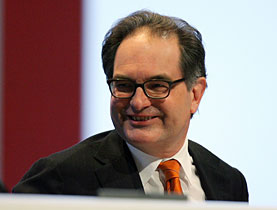Kurer replaces Ospel as UBS chairman

UBS shareholders have backed legal expert Peter Kurer to steer the troubled Swiss banking giant out of its present crisis by electing him the new chairman.
Kurer will replace Marcel Ospel, who took his leave at the bank’s annual general meeting on Wednesday. UBS has lost more than SFr37 billion ($37 billion) in the subprime mortgage crash.
Shareholders also voted in favour of a proposal to raise SFr15 billion of capital via a rights issue.
Kurer was elected to the bank’s board of directors on Wednesday and will be confirmed as chairman in the new future.
He said he would reform the chairman’s office, beef up the bank’s risk management controls, review the bonus compensation system and appoint new executives with specialist financial knowledge.
The 58-year-old will also oversee the new strategy of slimming down the One Bank model by stripping out riskier investment banking activities and concentrating on UBS’s core wealth management business.
“This nomination by the Board has come under public scrutiny and has attracted disparate views, including the suggestion that I am not the ideal candidate for this role,” Kurer told shareholders before the vote.
“I am not here to defend the choice. I have been asked to take on this role by the Board, and I have accepted the challenge out of my sense of responsibility for the bank, its shareholders, clients, staff and the communities we work in.”
Some shareholders, including former UBS chief executive Luqman Arnold, had questioned why an insider with no specialist banking experience should become chairman.
Speaking at the AGM, Dominique Biedermann, head of sustainable investment foundation Ethos, questioned whether the bank’s nomination committee had satisfactorily performed its task.
“Calmer waters”
Kurer put forward a five-point plan to steer UBS out of stormy waters. Top of the list was to protect the reputation of the bank’s wealth management division and prevent clients from taking their money elsewhere.
The other points were to put clients first, reinforce a culture of prudence and discretion, strengthen risk management and restore the bank’s image as a leading global financial institution.
Former Morgan Stanley chief financial officer David Sidwell was elected to head a new risk committee while the term of office for all board directors was cut from three years to one.
Departing chairman Marcel Ospel said he was ending his seven-year tenure of the office with the conviction that the worst was over for UBS.
“My departure from the company takes place under circumstances that none of us would have wanted. The change in chairmanship did not go as smoothly as would normally have been expected,” he said.
“Striking sail the moment we enter stormy waters is not my way. So despite the fact that I am now leaving the helm, I do so with the conviction that we have weathered the worst, that the storm is gradually passing, and that we will soon be sailing into calmer waters.”
The meeting lasted seven hours.
swissinfo with agencies
UBS general counsel Peter Kurer graduated in law from Zurich University and was admitted as attorney-at-law in Zurich. He also holds a law degree from the University of Chicago. He was born on June 28, 1949 and is a Swiss citizen.
He started his legal career as a law clerk at the District Court of Zurich.
He joined the Zurich branch of consultancy firm Baker&McKenzie in 1980, first as associate, and later as partner, staying there until 1990.
Between 1991 and 2001 he was a partner at the Homburger law firm in Zurich.
He joined UBS in 2001 as general counsel and was elected to the executive board a year later where he became a close ally of former chairman Marcel Ospel.
UBS endured a tough 2007, starting with the collapse of its hedge fund Dillon Read Capital management. Two months after that, in July, chief executive Peter Wuffli abruptly departed without clear explanation.
In October of last year, UBS said it would cut 1,500 jobs in its investment banking arm, including that of its head Huw Jenkins. UBS chief financial officer, Clive Standish, left at the same time.
Later that month the bank announced it was writing off SFr4.2 billion on subprime losses and SFr726 million pre-tax loss for the third quarter – the first quarterly loss in nine years.
In December UBS said another $10 billion would be written off as the US subprime crisis deepened. It also announced plans for a SFr13 billion funding plan from Singapore and Middle East investors, which was passed by shareholders in February.
A further $4 billion was written off in January, bringing the total losses to around SFr20 billion. Another SFr19 billion was written off in April, accompanied by the news of Marcel Ospel’s resignation as chairman.

In compliance with the JTI standards
More: SWI swissinfo.ch certified by the Journalism Trust Initiative











You can find an overview of ongoing debates with our journalists here . Please join us!
If you want to start a conversation about a topic raised in this article or want to report factual errors, email us at english@swissinfo.ch.